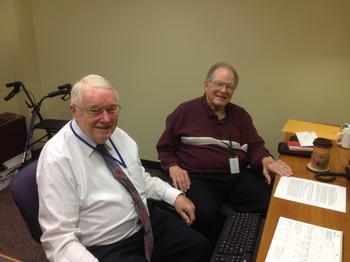Bob Abrams and Charles Stanford remember when the annual gathering of Presbyterian Men (PM) attracted 5,000 people to the campus of Northwestern University in Evanston, Ill.
“Times have changed,” says Abrams, 90, who with Stanford, 80, serves as volunteer coordinator for the official men’s organization of the Presbyterian Church (U.S.A.). The unlikely pair are PM’s only staff.
“We’re reorganizing from exclusive to inclusive,” Abrams says matter-of-factly, Now, every men’s group in every congregation is considered part of Presbyterian Men.”
Gone are all of the enrollment fees and annual dues previously required for men’s groups to formally join PM. “No one was paying them anyway and we never even sent out any bills,” Abrams chuckles.
For its modest financial needs, the organization is relying on two historic forms of funding: its Church Man of the Year program, in which congregations are encouraged to honor a male church member and make a donation to Presbyterian Men in his honor; and PM’s Birthday Celebration, in which men are encouraged to donate on their birthday one dollar for each year of age.
“Bob and I have both done it,” Stanford says. “That’s 170 bucks right there!”
Presbyterian Men ― officially called the National Council of Presbyterian Men ― started in the early 1900s and has continued in some form since. Its stated mission is “to equip and train all men to pursue the will of Jesus Christ through mission, outreach, education and discipleship.”
Its mission priorities are Bible study, disaster relief, combating racism and mentoring/tutoring.
The revival of PM has little to do with organizational or structural changes, Abrams says.
“We need to talk about mission, not organization. That has to be the emphasis.”
For instance, Presbyterian Men in Pittsburgh Presbytery have long been engaged in a program that offers expert professional building care and assistance to congregations that feel overwhelmed by nagging building problems. The group provides volunteer expertise through a network of Presbyterian architects, building contractors and building tradespeople to work hand-in-hand with congregational leaders to assess and meet congregations’ building problems and needs.
Abrams says Pittsburgh’s Presbyterian Men “would like to replicate their model for ministry in other cities and we’re trying to get the word out so they can.”
Another mission ― advanced by PM in collaboration with Marion Medical Mission in Malawi ― provides clean water to villagers through the digging of shallow wells. The technology is so simple that even the extreme poor can effectively maintain the wells.
PM has much to do with just two volunteer staff. Several years ago, when denominational funding cuts eliminated paid PM staff, Abrams ― a former PC(USA) mission worker in India ― responded to an appeal by Mid-Kentucky Presbytery for some volunteer help in the PM office at the Presbyterian Center here.
“I had time to give and have always appreciated the work of Presbyterian Men so I was happy to serve,” Abrams says.
About that same time, Stanford ― retired executive of Louisville (now Mid-Kentucky) Presbytery ― says he was being urged by his wife, Susan, who worked for Presbyterians Today magazine, “to do something.”
So, he continues, “I just showed up one day and said, ‘Here I am!’” Stanford, Abrams says, “has been a godsend.”
PM has its website, a quarterly newsletter ― Presbyterian Men in Action ― and promotes men’s activities in the church. Men’s groups can become a formal part of Presbyterian Men by registering on the PM website. The organization is governed by a 10-12 member board.
Though Presbyterian Men no longer sponsors national conferences, regional and racial ethnic men’s groups seem to be doing just fine.
Presbyterian Men of the Synod of Mid-Atlantic sponsors a large PM conference each summer. This year’s will be July 18-20 at Massanetta Springs Conference Center in Virginia. The Synod of the Trinity also sponsors a men’s conference each year. Hispanic Presbyterian Men held a well-attended conference last fall in Las Vegas, and both Korean Presbyterian Men and Native American Presbyterian Men gather regularly. A few years ago, all the men’s groups met together in Denver.
Rebuilding national Presbyterian Men seems a daunting task, but Abrams and Stanford are undeterred. “It keeps me young,” says Abrams. Stanford adds: “And it’s a good thing to do.”

